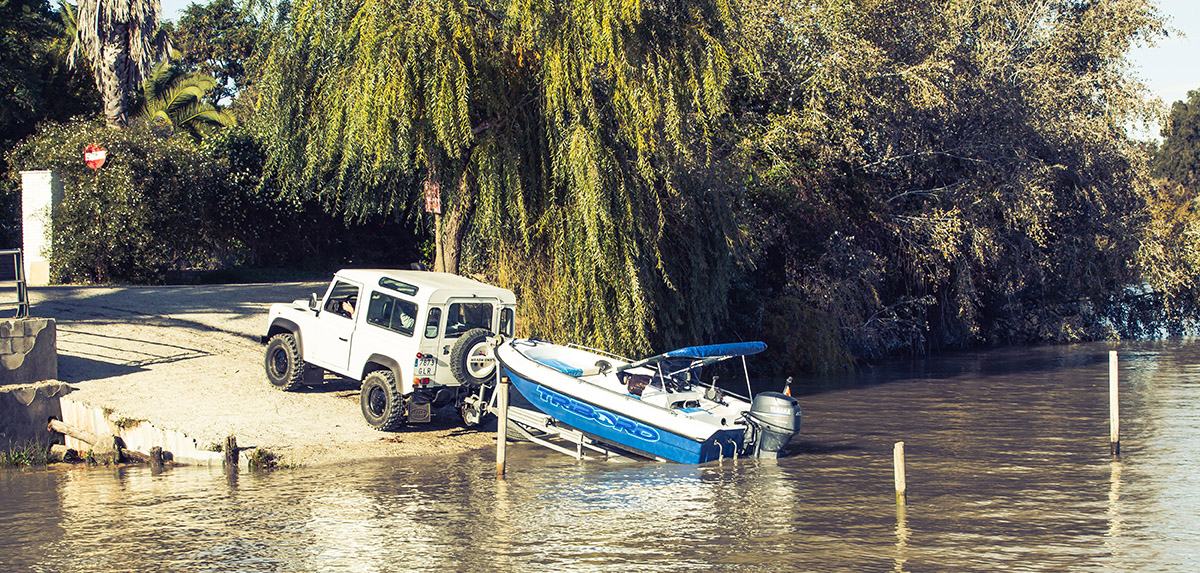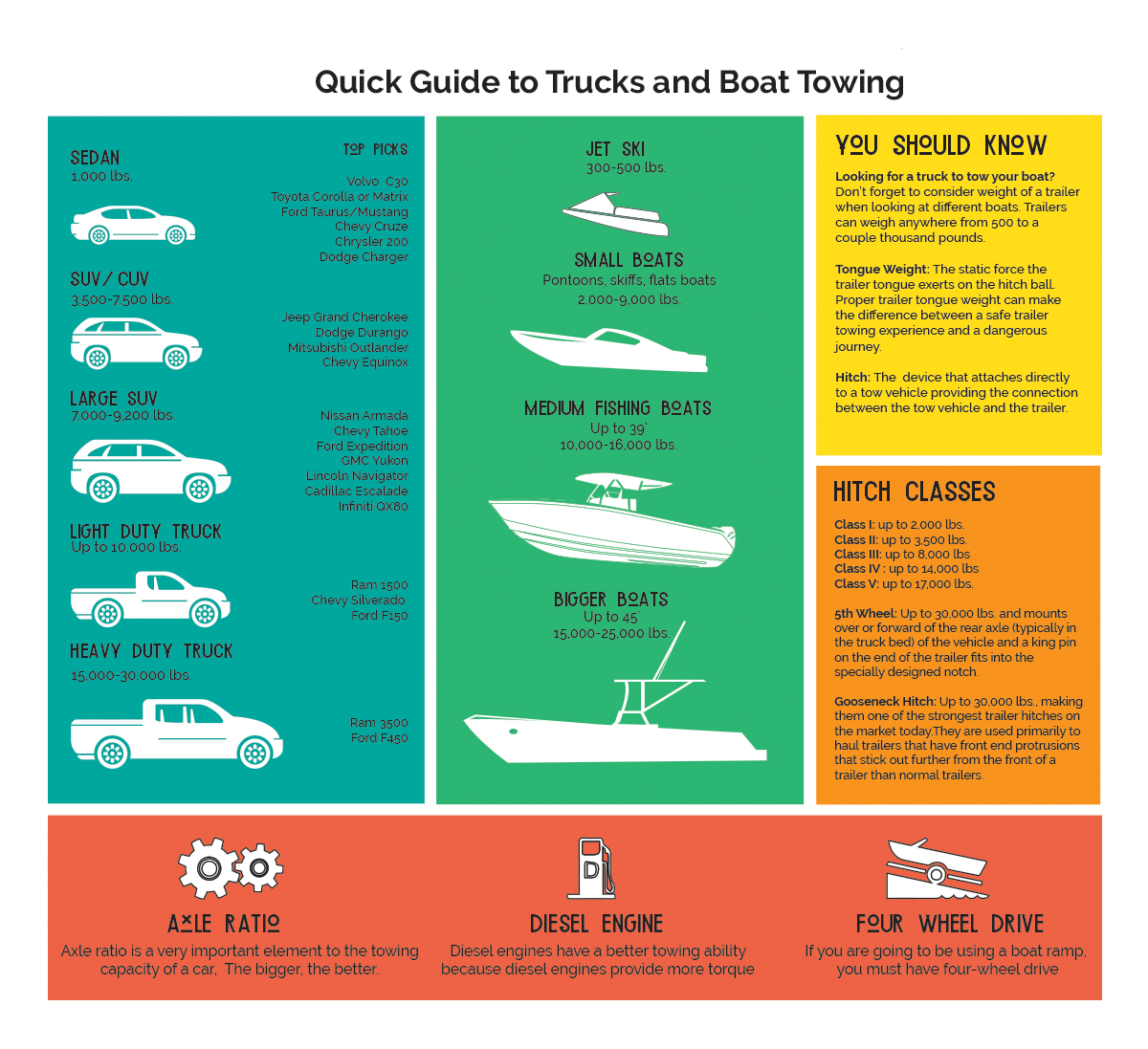
 Your Credit Estimate
Your Credit Estimate
 Your Credit
Your Credit
Your zip code helps us provide you with the most accurate vehicle pricing and vehicle availability.
We estimate your credit score to give you an idea of your monthly payments. To get an accurate payment amount, complete our credit application by clicking the Start Credit Application button below.
start credit application
As a state that is surrounded by beautiful water, it’s no surprise that boats are popular among Floridians. While boats are a great source for recreation, businesses like fishing, shrimping, diving and tourism industries rely on them to make money.
Just as important for a boat owner to know how to properly drive their boat, is to know how to tow their boat. Whether one needs to tow their boat to a boat ramp to get it in the water, or transport it for repairs and upkeep, having the correct equipment for towing it out of the water is essential to making sure one doesn’t damage their vehicle or a boat.
So unless someone wants to pay to get their boat towed each time they need to move it out of water, a transport vehicle is a necessity before buying a boat (unless it is a boat that exceeds an average of 45 feet). While there are many important details to consider, this article is to help give someone who is interested in buying a boat an idea of the type of equipment they will need for the boat they want. With that information, someone can decide whether they want to buy a vehicle for the boat or a boat based on their vehicle.
There are four main parts to consider when towing a boat -- boat, vehicle, trailer and hitch.

Watercrafts vary drastically in size. Of the smallest are jet skis and canoes, and the largest boats are yachts which can get as big as 500 feet! Generally, when a boat exceeds 45 feet, it cannot be towed without a commercial trailer and rig. So if you are planning on getting a boat that exceeds that length, you may not need to worry about towing.
In Florida, some of the most popularly towed boats are fishing boats ranging from flats boats to center consoles, and recreational boats for water sports and enjoyment. Depending on the length and number of engines on a boat, weight can vary drastically.
When researching boats and boat weights, there are two very important factors to keep in mind. First, does the weight of the boat, provided by the manufacturer, include the engine? Many times, the engine is not included in this weight, but engines can be a huge portion of a boat’s weight. The average 250-horsepower outboard motor is 500+ pounds. Second, is the weight of the boat dry weight? If you are transporting a boat that is filled with 50 gallons of gas, some water and ice, the weight of the boat can be more than five hundred pounds heavier.
The types of capable vehicles for towing is much smaller than the variety of boats available. A sedan or small car is really only practical for towing a maximum of one jet ski, or about 1,000 pounds. The next vehicle class is a small sport utility vehicle (SUV) or crossover utility vehicle (CUV), which are capable for a maximum of 7,000 pounds. The next class is a large SUV and the weight capacity on those only increase to about 9,200 pounds and following this would be a light duty truck which has a general maximum towing capacity of 10,000 pounds.
After weights of 10,000 pounds, a heavy duty truck is necessary to safely tow a boat and generally the only truck models that are capable of these weights are made by Ram and Ford.
For boats up to 17,000 pounds, a driver can with a Class V hitch, but if a boat exceeds that weight, one will need to buy a heavy duty truck with a specialized hitch.
There are two elements that factor into a truck’s towing capacity. One is the size of the truck’s cabin. The towing capacity of a truck decreases as the size of the truck’s cab increases. So be sure to get the correct data for the correct cab size. Second, is axle ratio. A truck with a bigger axle ratio is capable of towing more than the same truck with a smaller axle ratio.
The trailer is probably the easiest piece of equipment to determine. There are tons of trailers out there and many are able to service various types of boats. The biggest factors for determining which trailer to buy are determined by the weight and length of the boat and the weight of the trailer. Trailers may weigh anywhere from 500 pounds to a few thousand pounds.
Determining the hitch you will need is a trickier part of the towing process. While it is fairly straight-forward for boats that are less than 17,000 pounds, weights above that may require heavy duty trucks and a gooseneck or 5th wheel hitch. When working with that much weight, these specialized hitches are as important as the engine when it comes to towing capacity.
There's tons of trucks out there, but here are two trucks that are excellent buys in 2016.
First is the 2016 Chevy Colorado, which won the 2016 Motor Trend Truck of the Year. Two of the many reasons Motor Trend awarded the Colorado as this year's pick are the Colorado's excellent fuel economy -- getting an average of 23 MPG city, 31 MPG highway and 26.3 MPG combined-- and it's incredible powertrain made of a 181-horsepower, 2.8-liter inline-four Duramax diesel engine.
Wanna learn more about the Chevrolet Colorado? For detailed truck specs, visit our NowCar Chevy Colorado explore page, or shop our available trims here.
A second excellent truck to buy in 2016 is the 2016 Ram 3500. The Ram 3500 has a series of "Best in Class" titles that are super important when towing a boat. These titles include "Best in Class" for diesel towing and payload capacities and diesel torque.
Wanna learn more about the Ram 3500? For detailed truck specs, visit the Ram 3500 explore page, or shop our available trims here.
Of course you have questions -- towing can be complicated in the beginning. However, a great way to get some of the most specific information on what is needed to tow your boat is the boat seller. So if you find a boat you are interested in, get the exact weights and measurements from the seller, and then reach out to us to get the vehicle that will be capable and safe.